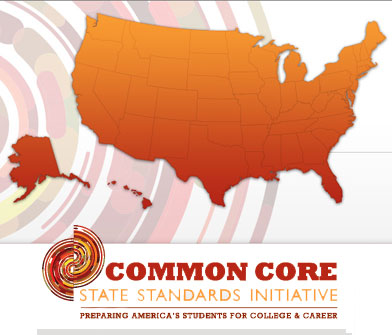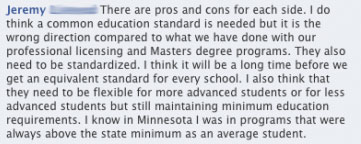Breaking Down Common Core, the Myths, the Truths, the Debates
Common Core – the next big thing in education reform – is getting a lot of positive and negative attention these days. Many of it isn’t accurate, like the requiring Grapes of Wrath for second graders. But what is it and what does it mean for the future of education? Here are a few misconceptions and the truth behind Common Core Standards.

(We asked our Facebook Fans what they thought about Common Core. We are sharing some of their responses throughout this post.)

Misconception
Common Core was set by the federal government and is mandated for all schools.
Truth
Common Core is a state-led effort by state leaders, state commissioners of education, state governors, the National Governors Association Center for Best Practices (NGA Center) and the Council of Chief State School Officers (CCSSO). Forty-five states have adopted the standards. Nebraska, Alaska, Texas, Minnesota and Virginia have yet to adopt them. They are being led by the states and are not mandatory.

Misconception
Common Core is mainly focused on high-stakes test scores.
Truth
Common Core Standards were designed to give every parent, teacher and student a clear idea of what are the standards of success to prepare children for college and the workforce. It is a common understanding of what students are expected to learn in every grade level. That said, Common Core-aligned tests are being developed and planned for the 2014/2015 school year, although some are already taking tests. The high-stakes tests that tie teacher salaries to test scores are the subject of a growing grassroots revolt where teachers are refusing to give them, students refusing to take them and parents keeping their children home on test days. The majority of teachers support Common Core Standards, but take issue with the testing and teaching to the test. This is the most controversial part of Common Core Standards.

![]()
Misconception
Politicians are determining what our students are learning.
Truth
Gates-funded consultants that included teachers, content and assessment experts, researchers, and standard experts wrote the standards. The drafted standards then received feedback from teachers, postsecondary educators, civil rights groups, English language learners and students with disabilities. They were also opened for public comment and received over 10,000 responses from teachers, parents, school administrators and citizens.

Misconception
English teachers will have to teach science and social studies in reading material.
Truth
English teachers will still teach both fiction and non-fiction literature. College and real world careers also demand a command of complex texts outside of literature. The Common Core Standards also include reading, research and writing in history and science. The idea is to integrate the subjects, because in the real world, science involves reading, writing, researching and more. Teachers in other subjects like science and social studies are also encouraged to build these important skills.

Misconception
All subjects are under strict guidelines from Common Core to tell teachers exactly what to teach in their classrooms.
Truth
Common Core only covers Math and English Language Arts and is not a curriculum. Many states and districts are interpreting the standards and molding them to their specific needs. Teachers will still be able to tailor their lesson plans to the needs of the students in their classrooms. The standards provide samples to help guide teachers on appropriate grade-level lessons, but teachers have the flexibility to make their own decisions on what texts or resources they use in the classroom. They do not tell teachers how to teach, they only tell them what students need to learn.

Misconception
Common Core Standards bring down all standards to the lowest common denominator. States with high standards will take a step back and we will fall even further behind international students.
Truth
There is an explicit agreement among the states that no state will lower its standards. Common Core builds upon the most advanced standards to help students achieve success in college and beyond. International benchmarking was important in setting the standards. It is supposed to raise expectations for all students vs. lowering them.

Common Core has its critics…some say we need less standardization instead of more and some do not like the way they are being implemented and adopted. It is by no way a perfect system or the end-all to education reform.

A bigger and very important debate is also being raised – the variation in funding state to state does not level the playing field. For example, Wyoming spends the most per student at $18,068 per year, while Utah spends the least at only $7,217 per student. This creates huge discrepancies in the resources available to teachers state to state. Districts also spend more or less on education based on socio-economic backgrounds and taxes. Some fear as the standards are raised, the funding will not follow, especially for lower-income schools and their students. But that’s an entirely different debate and post for another time.

Where do you fall in the Common Core debate?
Teachers – what are your experiences with Common Core so far?
Do you agree with it or disagree?
Are they easy to understand and implement?
What do you think of the standards themselves?

Sources and resources for this post –
- Myths fuel attacks on ‘Common Core’ standards: Our view (USAToday.com)
- Common Core foes spreading misinformation, Duncan says (Washington Post)
- Don’t fear Common Core, Nielsen tells local Republicans
- Report: Most IT Pros Say Common Core Will Be Good for Their District
- Don’t Fear Common Core – One teacher’s opinion (LA Times)
- In Push For ‘Common’ Standards, Many Parents Left Uneducated (NPR)
- CoreStandards.org




I agree that we need standards and find the common core standards comparable to all the other standards that have come down the pike. I also love inquiry based teaching. I have taught science for years and inquiry works well in that subject. HOWEVER inquiry in math leads to math phobias and an, “I’m not good at math” perception! Kids who have natural abilities with numbers explore and find alternate ways to solve problems naturally. Students who struggle with numbers need to be given clear instruction and formulas to follow. I HATE being told to let kids struggle through in math. I actually chose not to take the teacher certification test in math because of this method. I love math and always thought I would enjoy teaching it as much as I love teaching science. I had an opportunity to teach both last year. My kids showed the third highest growth in the county (1st and 2nd were magnet and charter schools) according to FCAT results. Guess what? I didn’t plan to let students struggle. That’s not to say none of them struggled…That’s another good point. Even great math students struggle from time to time. UGH!!! I could go on and on. Seems I have. Condensed version… CCSSS FINE, INQUIRY BASED LEARNING NOT FOR MATH.
I would like to congratulate Rachel on her high test scores. She must have a system that works well for her. There are however different levels of inquiry for both math and science. Inquiry can be directed, guided, or independent. I have seen the struggle that leads to an ah-ha moment… the ah-ha moment that leads to the deepening of a concept… and the retention and application of that concept in subsequent lessons. The best practices for both math and science indicate that inquiry is the preferred method for long-term retention and application. It is important to know the needs of your students and the strategies that work best for each one.
When a father is violently arrested for asking questions about “Common Core” at a public forum, there is something wrong with what is going on. Charges were later dropped, but the fact that he was arrested in the first place for an inquiry makes this extremely suspicious if you ask me.
http://www.washingtonpost.com/local/education/howard-county-parent-arrested-at-common-core-forum-becomes-cause-celebre/2013/09/23/fd4e1ad2-2481-11e3-b3e9-d97fb087acd6_story.html
Tracy – thank you for sharing this article. This has become a big story with people who oppose Common Core. The one fact that is being left out of the link sharing is that the father refused to submit his question in writing. The rules for the meeting were to submit all questions and feedback in writing and they would be addressed. The father was told his question would be answered, however, he continued shouting and making a scene during the meeting. He was arrested for disturbing the meeting, not voicing his concerns on Common Core.
It disappoints me to read the “truths” here. They are regurgitated explanations and selling points from the standards and testing funders, and the testing consortiums. Dig a little deeper.
Hi Candice – we appreciate your comments. We did use the Common Core website as a resource, as noted at the bottom of this post. We did also use reputable sources, like the LA Times, NPR, Washington Post, and USAToday.com. The focus was to inform, not give an opinion, although we did include a variety of opinions from our Facebook fans.
I am a math phobe currently learning how to present math as an inquiry process. I can tell you that had I been taught this way to begin with, I would probably have ended up studying to be a middle school math teacher instead of middle school science. Yes, there is struggle, but when used properly and with guiding prompts from a trained teacher, the struggle creates thought. What a novel idea, teaching students how to think through modeling and questions.
It is incredibly difficult for me to change my perspective, but as I am seeing results in my own comprehension and math abilities, I am motivated to do so. For the record, I am a 45 yr old returning student, so I have some deep set thought processes and insecurities when it comes to math, but I am overcoming them – through effective inquiry.
Found this 3″ video on CCSS on SchoolTube:
http://www.schooltube.com/video/13ad53b141a349f389d6/Common%20COre%20State%20Standards
….to add to the discussion. Thanks, Steve.